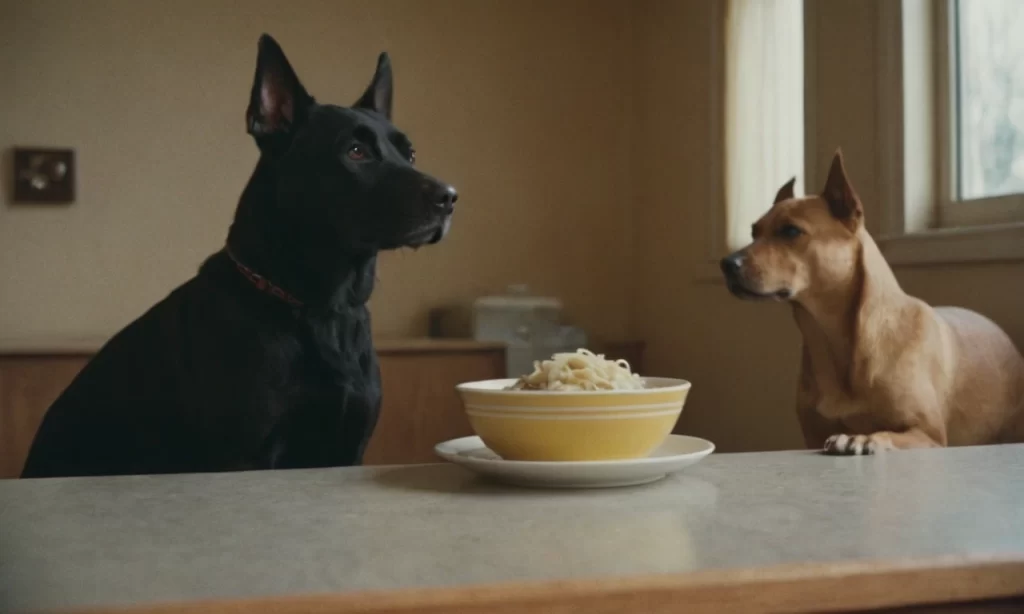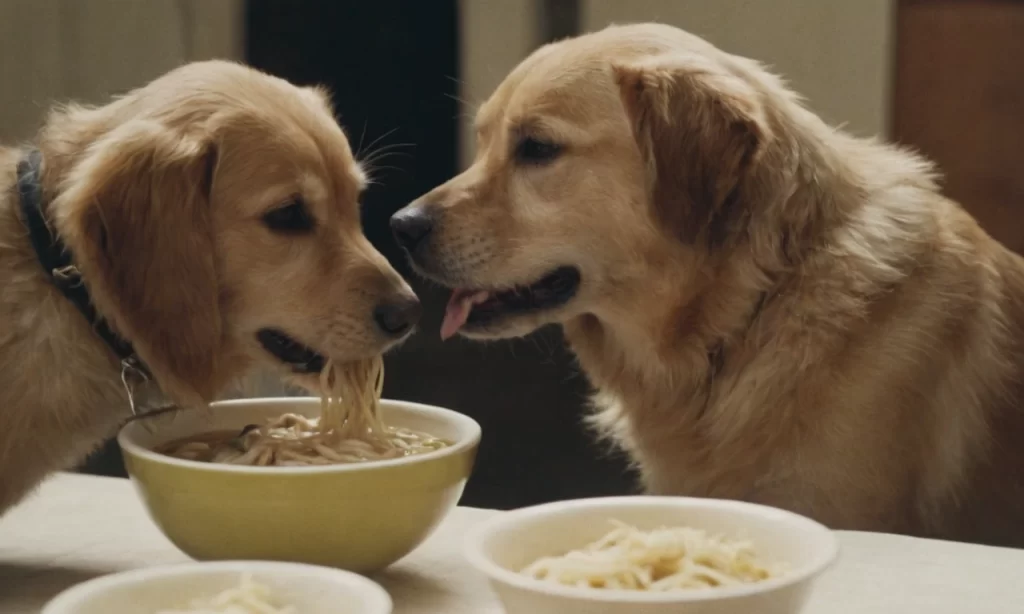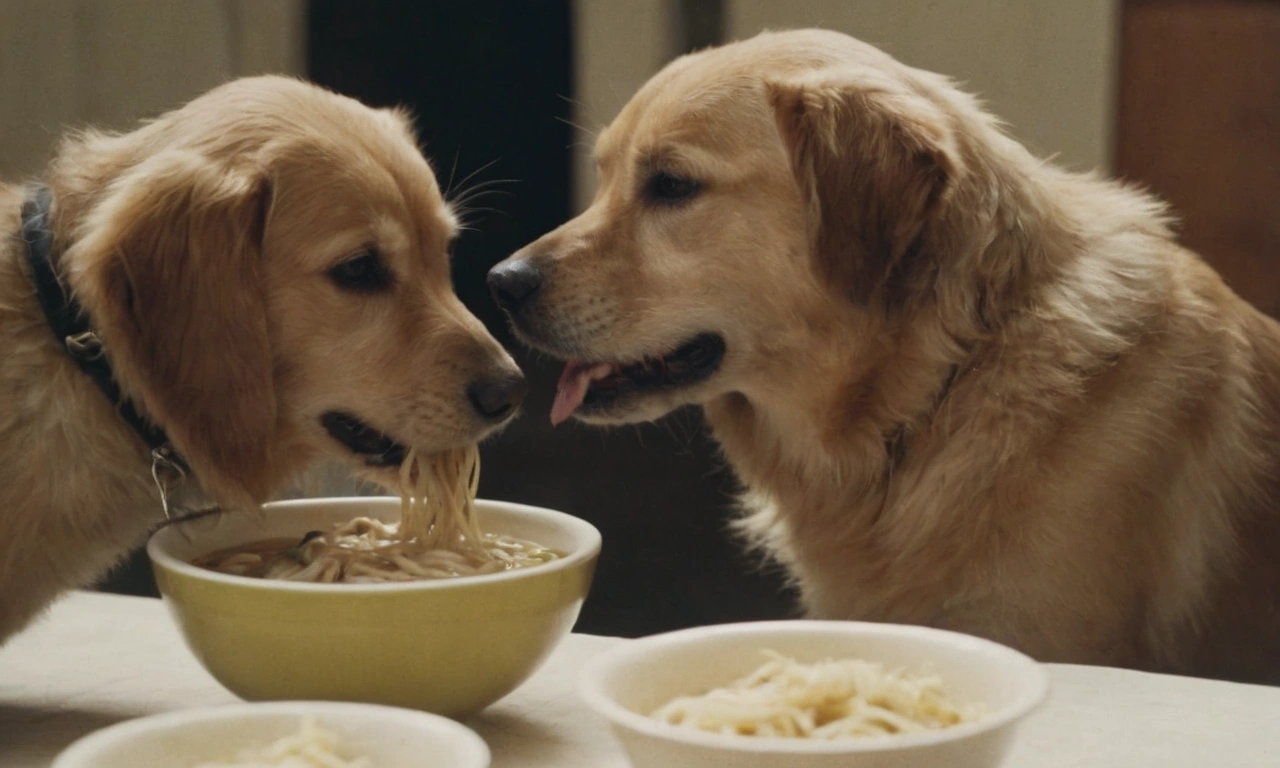When it comes to feeding our furry friends, we often wonder about the safety of certain human foods. One common question that pops up is whether can dogs eat chicken noodle soup. This article delves deep into this query, unraveling the mysteries of canine nutrition and the potential impact of chicken noodle soup on our beloved pets. From homemade recipes to store-bought options, we’ll explore all facets to ensure your dog can enjoy this comfort food safely.
Can Dogs Eat Chicken Noodle Soup? An Overview

Ah, chicken noodle soup – the quintessential comfort food that warms the soul on a chilly day. But the big question is, can our four-legged companions partake in this human delicacy? Well, the short answer is, it depends.
Homemade chicken noodle soup can be a savory treat for dogs, provided it’s made with dog-safe ingredients. Unlike the human version, which is often laden with salt and seasonings, a canine-friendly soup should be devoid of any harmful additives. Ingredients like onions and garlic, common in our soups, are a big no-no for dogs, as they can lead to serious health issues.
But before you start whipping up a batch, it’s crucial to understand the nutritional needs of your dog. Canines thrive on a balanced diet tailored to their specific health requirements. While chicken noodle soup can provide some nutritional benefits, such as hydration and a few essential vitamins, it should never replace their regular dog food. After all, moderation is key, and what works for one dog might not suit another.
Now, if you’re eyeing that can of chicken noodle soup in your pantry, thinking it might be a quick fix, hold that thought! Most store-bought soups are packed with sodium and preservatives, which can be harmful to dogs. So, if you’re keen on treating your pup to some soup, sticking to a homemade recipe is your best bet.
In essence, while dogs can enjoy chicken noodle soup, it’s crucial to ensure it’s made with their health in mind. Stay tuned as we dive deeper into the dos and don’ts of feeding chicken noodle soup to your canine companion in the following sections.
Homemade vs. Store-Bought: What’s Safe for Your Dog?
When it comes to sharing chicken noodle soup with your canine pal, the devil is in the details—or, in this case, the ingredients. Let’s break down the two main types of chicken noodle soup you might consider for your dog: the homemade variety and the store-bought version.
Homemade Chicken Noodle Soup: A Tail-Wagging Treat
Going the homemade route is like hitting the jackpot for your dog’s taste buds and health. You have full control over what goes into the pot, ensuring every ingredient is dog-friendly. Picture this: lean, cooked chicken without the skin, a smattering of safe vegetables like carrots, and a plain broth that’s free from the usual human seasonings. Sounds delicious, right? Your dog thinks so too!
However, it’s not just about throwing in what you think is safe. Certain veggies that are healthy for us can wreak havoc on a dog’s system. So, research is key before you start playing chef for your pup.
Store-Bought Soups: A Can of Worms
Now, let’s turn our attention to the convenience of canned or pre-packaged soups. Sure, they’re easy and quick, but they’re often loaded with things that are no good for our furry friends. High sodium content, preservatives, and seasonings like onion and garlic powder can turn that convenient meal into a potential health hazard. Not to mention, the fat content in some of these soups could send your dog’s pancreas into a frenzy.
So, while it might be tempting to ladle out some store-bought soup into your dog’s bowl, especially on those busy days, it’s a gamble that’s not worth taking. Your dog’s health and safety should always come first, and unfortunately, most store-bought chicken noodle soups don’t make the cut.
In conclusion, if you’re looking to share the cozy comfort of chicken noodle soup with your dog, homemade is the way to go. It requires a bit more effort, but the wagging tail and happy eyes will be well worth it. Stay tuned as we delve into the nitty-gritty of what makes a chicken noodle soup truly dog-friendly in the upcoming sections.
Preparing Dog-Safe Chicken Noodle Soup
Whipping up a batch of chicken noodle soup that’s safe for your dog isn’t just about omitting onions and garlic. It’s about creating a wholesome, nutritious meal that caters to your dog’s unique dietary needs. Let’s dive into how you can prepare a dog-safe version of this classic comfort food.
How to Make Chicken Noodle Soup Safe for Dogs
The golden rule here is simplicity. Start with a base of plain, unseasoned chicken broth. If you’re making the broth from scratch, avoid adding any harmful ingredients like onions or garlic. The simpler, the better.
Next up, the chicken. Opt for lean, skinless chicken breasts. Cook them thoroughly and shred the meat into bite-sized pieces, ensuring there are no bones that could pose a choking hazard or cause internal blockage.
Now, for the noodles. While regular egg noodles are fine, consider whole grain or even gluten-free options if your dog has a sensitive stomach. Remember, the noodles are more for texture and variety; they shouldn’t be the main ingredient.
Choosing the Right Ingredients
Incorporating vegetables into your dog’s chicken noodle soup not only adds flavor but also boosts the nutritional value. Carrots are a fantastic addition, providing beta-carotene, which supports eye health. You might also consider green beans or sweet potatoes, which are packed with fiber and vitamins.
However, it’s essential to cook these vegetables thoroughly to make them easier for your dog to digest. And always chop them into manageable, bite-sized pieces to prevent any choking risks.
The Importance of Avoiding Seasonings and Additives
This cannot be stressed enough: seasonings and additives that are harmless to humans can be detrimental to dogs. Salt, in particular, should be avoided as it can lead to sodium ion poisoning in dogs, manifesting symptoms like vomiting, diarrhea, and even seizures.
In summary, preparing chicken noodle soup for your dog is an act of love that requires attention to detail. Stick to simple, wholesome ingredients, and always keep your dog’s health and dietary restrictions in mind. With a little effort, you can turn this human comfort food into a safe, enjoyable treat for your dog.
Preparing Dog-Safe Chicken Noodle Soup

Whipping up a batch of chicken noodle soup for your dog is more than just a gesture of love; it’s a commitment to their health and well-being. But fear not, for creating a dog-safe version of this classic comfort food is simpler than you might think. Let’s dive into the essentials of crafting a nutritious and delicious soup your canine companion will adore.
How to Make Chicken Noodle Soup Safe for Dogs
The golden rule here is simplicity. The fewer ingredients, the better, and each one should be beneficial—or at least not harmful—to your dog. Start with a base of good, old-fashioned water or a low-sodium broth devoid of onions, garlic, and heavy spices. This ensures your furry friend stays hydrated without the risk of ingesting anything toxic.
Next up, the chicken. Opt for lean, skinless cuts like breast meat, and cook it thoroughly to avoid any risk of foodborne illnesses. Remember, no seasonings! Dogs don’t need salt, and they certainly don’t need the added flavors we humans often enjoy.
When it comes to noodles, plain, cooked egg noodles will do the trick. Keep portions small to avoid unnecessary carbs and ensure they’re well-cooked to make them easier for your dog to digest.
Choosing the Right Ingredients
Vegetables can add a nutritional punch to your dog’s chicken noodle soup, but choose wisely. Carrots and peas are fantastic, offering vitamins and a touch of sweetness. However, avoid anything potentially toxic, like onions or garlic, and steer clear of vegetables that might cause gas or digestive upset, such as broccoli or cauliflower.
The Importance of Avoiding Seasonings and Additives
It bears repeating: Seasonings and additives are a no-go in doggy cuisine. While a dash of salt or a sprinkle of garlic powder might elevate a dish for human taste buds, these additives can be harmful to dogs. Stick to the natural flavors of the ingredients, and your dog will be just as happy—if not happier—without the extra flair.
Creating a chicken noodle soup that’s safe and satisfying for your dog is an act of love that also prioritizes their health. By following these simple guidelines, you can whip up a meal that’ll make your dog’s tail wag with joy. Stay tuned as we explore how to serve this delightful dish to your furry friend in the right way.
Serving Suggestions and Precautions
Once you’ve mastered the art of making dog-safe chicken noodle soup, the next step is serving it in a way that complements your dog’s diet and lifestyle. After all, even the healthiest of treats should be enjoyed in moderation.
How to Introduce Chicken Noodle Soup into Your Dog’s Diet
Introducing any new food into your dog’s diet should be done gradually to avoid upsetting their stomach. Start by offering a small spoonful of your homemade soup as a treat or mixed in with their regular dog food. Observe their reaction over the next 24 hours. If there are no adverse effects, you can gradually increase the amount, ensuring it remains a treat rather than a meal replacement.
Remember, while chicken noodle soup can provide hydration and a few nutrients, it shouldn’t displace your dog’s balanced, nutrient-rich dog food. Treats, including soup, should make up no more than 10% of your dog’s daily caloric intake.
When to Avoid Serving Chicken Noodle Soup to Your Dog
There are times when even a well-prepared chicken noodle soup might not be suitable for your dog. Dogs with sensitive stomachs, dietary restrictions, or specific health issues such as kidney problems, might need to steer clear of even the most benign homemade soups. In such cases, it’s best to consult with your veterinarian before introducing any new foods into your pet’s diet.
Additionally, be mindful of the ingredients you use. If your dog is allergic to any specific vegetables or has had issues with chicken in the past, it’s better to err on the side of caution and avoid adding those ingredients to their soup.
In essence, chicken noodle soup can be a delightful treat for your dog, provided it’s served responsibly and in moderation. As with any dietary change, monitoring your dog’s response and consulting with a vet when in doubt are key steps to ensuring their health and happiness.
Stay tuned as we wrap up with some final thoughts and considerations on feeding chicken noodle soup to your furry family member.
Common Questions Answered
When it comes to feeding your dog chicken noodle soup, you might have a few questions. Let’s dive into some of the most common queries dog owners have, ensuring you’re fully informed about incorporating this comfort food into your pup’s diet.
Can chicken broth in soup benefit dogs?
Absolutely! Chicken broth, especially when made at home without harmful additives, can be a great source of hydration and comfort for dogs, particularly if they’re feeling under the weather. It’s packed with nutrients like amino acids, which can support joint health and a healthy immune system. Just remember, the broth should be plain and free from onion, garlic, and excessive salt.
Will chicken noodle soup help a dog with an upset stomach?
Chicken noodle soup can be soothing for a dog with a mild stomach upset, thanks to its hydrating properties and easily digestible ingredients like plain chicken and carrots. However, if your dog’s stomach issues persist or are severe, it’s crucial to consult your vet. The soup should be a supplementary treat, not a medical solution.
Is it okay to feed my dog chicken noodle soup regularly?
While an occasional serving of chicken noodle soup can be a tasty treat for your dog, it shouldn’t become a regular part of their diet. Dogs require a balanced diet tailored to their specific nutritional needs, usually provided by high-quality commercial dog food or a vet-approved homemade diet. Treats, including chicken noodle soup, should only make up a small fraction of their overall intake.
Can puppies have chicken noodle soup?
Puppies have delicate digestive systems and specific dietary needs to support their growth and development. While a small amount of plain, homemade chicken noodle soup might be okay for older puppies, it’s best to consult with your vet first. Puppies should primarily be fed a diet specifically formulated for their developmental stage.
Armed with the answers to these common questions, you can make informed decisions about treating your dog to chicken noodle soup. Remember, every dog is unique, and what works for one might not be suitable for another. When in doubt, your vet is always the best source of advice for your pet’s dietary needs.
Stay tuned for our final thoughts and some key takeaways in the concluding section of our guide.
Conclusion: Final Thoughts on Chicken Noodle Soup for Dogs
As we wrap up our culinary journey into the world of chicken noodle soup for our canine companions, it’s clear that this classic human comfort food can, indeed, be adapted for dogs. However, it requires careful consideration and preparation to ensure it’s both safe and enjoyable for them.
Homemade chicken noodle soup, devoid of harmful seasonings and ingredients, can offer a tasty, hydrating treat for your dog. It’s an excellent way to add some variety to their diet, especially on cold days or when they need a little extra nourishment. Yet, it’s vital to remember that this should only complement their balanced diet, not replace it.
The key takeaway here is the importance of moderation and mindfulness when it comes to feeding our pets human foods. Dogs have different nutritional needs and sensitivities than humans, and what’s harmless or even healthy for us can sometimes be dangerous for them.
As pet owners, our furry friends’ health and happiness are in our hands. By making informed choices about their diet, consulting with veterinarians when in doubt, and always putting their needs first, we can ensure they lead long, joyful, and healthy lives.
In the end, sharing a bowl of chicken noodle soup with your dog can be more than just a treat; it’s an act of love and care. So, here’s to many more shared moments of warmth and wellness with our beloved pets.

